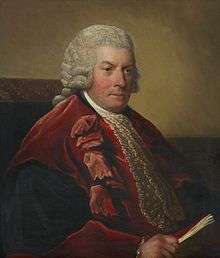Ilay Campbell, Lord Succoth
Sir Ilay Campbell, Lord Succoth FRSE LLD (1734–1823) was a Scottish advocate, judge and politician.
Lord Succoth | |
|---|---|
 Portrait by David Martin | |
| Lord President of the Court of Session Lord Justice General | |
| In office 1789–1808 | |
| Appointed by | George III |
| Preceded by | Lord Glenlee |
| Succeeded by | Robert Blair |
| Member of Parliament for Glasgow Burghs | |
| In office 1784–1790 | |
| Preceded by | John Craufurd |
| Succeeded by | John Craufurd |
| Lord Advocate | |
| In office 1784–1790 | |
| Preceded by | The Hon Henry Erskine |
| Succeeded by | Robert Dundas |
| Solicitor General for Scotland | |
| In office 1783–1784 | |
| Preceded by | Alexander Murray |
| Succeeded by | Robert Blair |
| Personal details | |
| Born | 1734 |
| Died | 1823 (aged 89) |
| Political party | Pittite |
| Profession | Advocate, Judge, Politician |
Life
Campbell's birthplace is given as either Argyll or Edinburgh. His mother was Helen Wallace, and his father, Archibald Campbell of Succoth, Principal Clerk of Session to the Scottish Courts.[1]
He attended Mundell's School in Edinburgh[2] and then the University of Glasgow to study law, graduating in 1751.
An advocate from 1757, he was engaged in the Douglas peerage case from 1764 to 1769. He was appointed Solicitor General for Scotland in 1783 and Lord Advocate in 1784. He became Member of Parliament for Glasgow Burghs in the same year. He was Lord President of the Court of Session and Lord Justice General from 1789 to 1808, where he sat as Lord Succoth.
On his resignation in 1808, he was created a baronet,[3] and resided at Garscube House,[4] about four miles from Glasgow on the banks of the river Kelvin. There he engaged in the management of his estate, and the performance of his duties as a country gentleman. Lord Cockburn says of him that "he lived like a patriarch in a house overflowing with company, beloved by troops of relations, and courted for his character and hospitality by many friends."
Campbell was awarded an honorary doctorate (LLD) from the University of Glasgow in 1784, and elected Lord Rector of the University in 1799. He died in 1823 aged 89.
Campbell was succeeded by his son Archibald, also a Senator of the College of Justice under the same title of Lord Succoth.
It is worth observing that the title "Lord Succoth" derived from the 1st and 2nd baronets' status as law lords rather than as Lords of Parliament. As such, the title "Lord Succoth" was not hereditable. The honorific "The Much Honoured" references a feudal barony ("of Succoth"). Sir Ilay's descendants remained baronets until the extinction of the baronetcy in 2017.[5]
Family
Campbell married Susan Mary Murray of Murrayfield, sister of Alexander Murray, Lord Henderland[6] in 1766. She lived until 1815.
Their daughter, Margaret Campbell, married Sir John Connell, Judge of the Admiralty Court, and their son, Arthur Connell FRSE (Campbell's grandson) was a chemist who discovered connellite.[1]
Their daughter Elizabeth Campbell (d.1853) married William Dalziell Colquhoun. Their daughter Mary Frances Campbell died in 1870 without marrying. These two sisters are buried in Dean Cemetery.
Positions of note
- Founder member of the Royal Society of Edinburgh (1783)
- Director of the Highland Society (1784)
References
- http://www.royalsoced.org.uk/cms/files/fellows/biographical_index/fells_indexp1.pdf
- "CAMPBELL, Ilay (1734–1823), of Succoth, Argyll. – History of Parliament Online".
- "No. 16179". The London Gazette. 3 September 1808. p. 1214.
- XLVI. Garscube Glasgow Digital Library: The old country houses of the old Glasgow gentry
- Obituary of Sir Ilay Campbell of Succoth Bt. https://www.scotsman.com/news/obituaries/obituary-sir-ilay-campbell-of-succoth-gardening-and-heraldry-expert-1-4375168
- "MURRAY, Alexander (1736–95), of Murrayfield, Edinburgh, and Henderland, Peebles. – History of Parliament Online".
- . Dictionary of National Biography. London: Smith, Elder & Co. 1885–1900.
| Parliament of Great Britain | ||
|---|---|---|
| Preceded by John Craufurd |
Member of Parliament for Glasgow Burghs 1784–1790 |
Succeeded by John Craufurd |
| Legal offices | ||
| Preceded by Alexander Murray |
Solicitor General for Scotland 1783–1784 |
Succeeded by Robert Blair |
| Preceded by The Hon Henry Erskine |
Lord Advocate 1784–1789 |
Succeeded by Robert Dundas |
| Preceded by Lord Glenlee |
Lord Justice General 1789–1808 |
Succeeded by Robert Blair |
| Academic offices | ||
| Preceded by George Oswald of Auchencruive |
Rector of the University of Glasgow 1779–1801 |
Succeeded by Lord Craig |
| Baronetage of the United Kingdom | ||
| New creation | Campbell baronets (of Succoth) 1808–1823 |
Succeeded by Archibald Campbell |